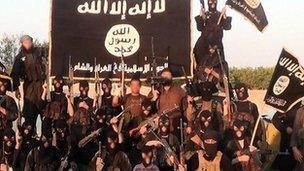Briton 'doing his duty' by fighting for group linked to al-Qaeda in Syria
- Published
Ifthekar Jaman, who's in Syria, has been speaking to 'Newsnight' reporter Richard Watson
A British man in Syria has told the BBC why he is fighting for a group linked to al-Qaeda.
Ifthekar Jaman, 23, from Southsea, Hampshire, told Newsnight the Islamic State in Iraq and the Levant (ISIS) was engaged in a jihad to establish a state based on Islamic religious law.
He said it was his "duty" because Muslims were "being slaughtered".
Mr Jaman, whose family come from Bangladesh, is believed to have left the UK in spring of this year.
His exact location inside Syria is unclear. Newsnight managed to speak to him via an internet video call, with the help of his brother in the UK.
'Good deed'
"I am ISIS. This is the group I am with. We are trying to establish the law of God, the law of Allah," he said.
"This is the duty on me... all these people are suffering. Muslims are being slaughtered."
Meanwhile, the Foreign Office said it was looking into reports in the Times newspaper that four Britons had been killed in Syria in recent weeks while fighting against government forces.
In a statement, it said: "The UK has advised against all travel to Syria. Anyone who does travel is putting themselves in considerable danger.
"And moderate Syrians have been explicit that they want aid, not foreign fighters. The best way for the public to help is to donate to registered charities that have ongoing relief operations."
Mr Jaman's brother, Mustakim, said his family understood the reasons for joining the jihad - a holy war or struggle, to establish a caliphate, a state based on Sharia, Islamic religious law - in Syria.
He said: "If he dies in his cause, then he's not died in vain, has he? He's doing a good deed."
Mustakim Jaman said he believed his brother had become radicalised over a long period of time.
He said: "He was always trying harder and harder to practise [Islam]. He was always trying to be as strict as he can, he wanted to be the best Muslim."
A link Mr Jaman posted on his Twitter feed before he left for Syria shows he was interested in the teachings of Anwar Awlaki - an Islamic preacher killed in Yemen 2011, who encouraged his followers to attack Western targets.
'Best religion'
Mr Jaman has continued posting from Syria, and has more than 2,000 Twitter followers.
In one recent entry, he explains how he "came to answer the call of the oppressed".
MI5 says the number of British fighters in Syria is in the "low hundreds" and has expressed fears they could return home and pose a security threat.

ISIS now runs the Syrian city of Raqqa
But Mr Jaman told Newsnight he did not pose a threat to the UK - as he had no plans to return home.
He refused to say whether he thought Britain should be run by Islamic law, adding only: "It's the best religion for mankind."
In May, ISIS won control of the Syrian city of Raqqa, and marked the victory by publicly killing three men it said were Alawites, members of the same sect as President Bashar al-Assad.
Since then, activists who have fled the city say opponents of ISIS have been beaten, the sale of alcohol has been banned and women made to wear Islamic dress.
Mustakim said ISIS was not an extremist organisation.
"Terrorists don't open schools, places for educating children, they don't fund kids, they don't fund families," he said.
'Social welfare'
But Shiraz Maher, from the International Centre for the Study of Radicalisation, part of Kings College London, said the pastoral services provided by ISIS were only part of the story.
"ISIS is an extremist group, it's part of al-Qaeda," he told Newsnight, adding that al-Qaeda "realises it needs to do social welfare, it needs to reach out to people".
"They are on the ground in Syria distributing food, making sure people have electricity to stay warm at night in their homes, making sure people are well protected well fed," Mr Maher added.
"That is something new they are exploring and really exploiting quite well on the ground in Syria right now."
Earlier this month, Andrew Parker, head of domestic intelligence service MI5, told a parliamentary hearing the Syrian conflict was attracting al-Qaeda sympathisers from the UK.
"Syria has become a very attractive place for people to go for that reason - those who support or sympathise with the al-Qaeda ideological message," Mr Parker told the Intelligence and Security Committee in London.
Their interaction with militant groups abroad was a "very important strand of the threat" the UK faced, he said.
See more from Richard Watson on Newsnight on the BBC iPlayer and the Newsnight website.
- Published7 November 2013
- Published13 November 2013
- Published15 October 2013